(posted February 9) Come to the Mennonite Heritage Center on March 7, 2026, from 10 a.m. to 12 p.m. for “The Why and What of Anabaptism: A Congregational Resourcing Workshop with Karl Landis.” He will offer an opportunity for participants to equip their congregations with a concise and memorable understanding of Anabaptist beliefs and practices. Registration is required ($20/person): Register here. Copies of his book, Inside Mennonite Life and Thought, will also be available for sale. Refer to this flyer for more information.
Mennonite Heritage Center
Mennonite Heritage Center’s Menno (Game) Nite
(posted January 24) Enjoy a cozy evening of fellowship with family and friends at the Mennonite Heritage Center’s Menno (Game) Nite on February 20, 2026, from 5:30 to 8:00 p.m. MHC will provide some games, but participants are invited to bring their own games. We will offer hot drinks and water at the event. You’re welcome to BYOS (Bring-Your-Own-Snacks). MHC’s exhibits will also be open. Come for fun, fellowship, and a side of Mennonite history. Check out this flyer for more details.
Honoring the Trailblazing Women in Ministry
by Donna Merow
When I saw the announcement about the Women in Ministry presentation at the Mosaic Conference-Related Ministry Mennonite Heritage Center (Harleysville, PA), I rearranged my schedule to be there.
Mary Nitzsche introduced the oral history project she and Beth Yoder began in 2022. As their ministerial careers were winding down, they had the time and recognized the need to gather and preserve the stories of women in the former Franconia and Eastern District Conferences, now in their 70s and 80s, who “plowed the ground” for women in leadership. Several of these trailblazing women had already passed, so they wasted no time in formulating questions, scheduling visits, and conducting interviews.
During the event, Yoder and Charlotte Rosenberger shared the history of what became the Franconia Women’s Council on Leadership. The movement began in April 1987, when a group of women began gathering monthly on Saturday mornings at Souderton (PA) Mennonite to share their stories and gifts, to support one another, and to challenge existing limits. They were mothers, teachers, professors, social workers, students, writers, counselors and those in ministry. Together, they wrestled with finding a name, claiming an identity and defining their purpose.
Drawing from meeting minutes, journal entries, and sermons, Yoder and Rosenberger captured the spirit of that era, when issues such as the head covering were debated in various venues.
Following their presentation, three women in leadership offered first person accounts: Marty Kolb-Wyckoff (the first women ordained by Franconia Conference); Donella Clemens (who moved from local church ministry to positions in the conference and denomination); and Charlene Smalls (the first African American woman ordained by Mosaic Conference who serves at Ripple Church [Allentown, PA] and Alpha [NJ] Mennonite). Each woman brought a distinct voice to the morning.
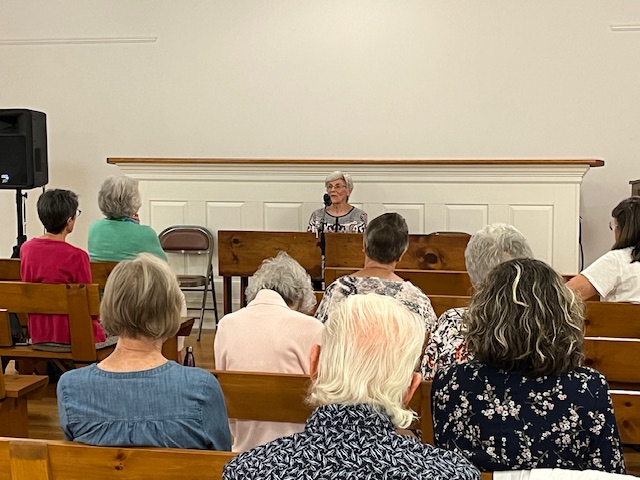
After two painful failed candidacy experiences, Kolb-Wyckoff was called as pastor at Taftsville (VT) Chapel Mennonite Fellowship in 1987 and ordained in 1990. Clemens, an inquisitive child, fondly remembered asking her farmer father theological questions while they tended cows together. Smalls shared how her baptism was delayed 20 years because of a hole in the baptismal pool. She credited her three grandmothers for shaping her into the woman of faith standing before us.
Certain themes also wove these stories together. Supportive men were named, such as Willard Swartley, Richard Detweiler, Duane Kauffman, and Merlin Hendrick. Other pioneer women were also mentioned, like Polly Ann Brown, Barbara Shisler, Helen Lapp, Mary Jane Hershey, and Dawn Ruth Nelson.
Themes of doubt and disappointment, patience and perseverance, and a willingness to experiment, explore, take risks, and change course were recurrent. Several women expressed the tension they felt between their deep commitment to motherhood and a restlessness of spirit often prompted by others’ observations and questions.
I wasn’t the only one in the audience who has been a direct beneficiary of the groundbreaking efforts of these courageous women. Hearing their stories was an inspiring reminder of the faith, hope and love of our foremothers, which continues to shape us today.

Donna Merow
Donna became a Mennonite when she was rebaptized at Methacton (PA) Mennonite in 1979. She began attending Ambler (PA) Mennonite while teaching at Germantown Academy and was called as pastor there in 2009. She left in 2018 for a chaplain residency program at Geisinger Medical Center in Danville. At the conclusion of her residency, she served as director of pastoral care at Conference-Related Ministry Living Branches. She returned to Danville in 2022 to accept a pediatric chaplain position and regularly interacts with fellow Anabaptists (Amish, Old Order and other Mennos, German Baptist Brethren). She maintains her membership at Methacton Mennonite.
Mosaic values two-way communication and encourages our constituents to respond with feedback, questions, or encouragement. To share your thoughts or send a message to the author(s), contact us at communication@mosaicmennonites.org.
Celebrating 500 Years of Anabaptist Worship at Ripple Church
By Charlene Smalls
Ripple Church (Allentown, PA) in partnership with Whitehall (PA) Mennonite and the Mennonite Heritage Center (Harleysville, PA), invites you to a 500-Year Anabaptist Celebration Experience!
Gather with us at 4 p.m. on Sunday, September 28, for a special event commemorating five centuries of Anabaptist history. This celebration will bring together many people from the local Mosaic Conference community to honor the traditions of worship that have shaped our shared faith journey.
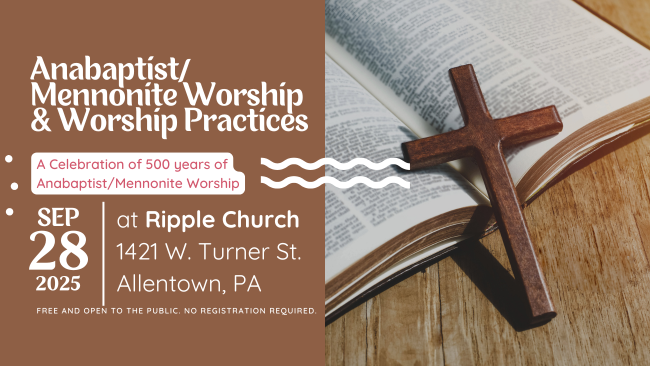
The afternoon will be a tapestry of music, storytelling, and visuals, designed to both educate and inspire.
The event will feature a series of reflections and performances that bring our history to life. Joel Horst Nofziger, Executive Director of the Conference-Related Ministry Mennonite Historians of Eastern PA, will share about the character of Anabaptist worship over time.
Mosaic Leadership Minister Jeff Wright will speak on new movements in Mennonite worship. Conference Moderator and Ripple Co-Pastor Angela Moyer Walters will reflect on worshipping as Mosaic.
These storytellers will be joined by Dr. Rashard Allen, who will provide beautiful music to guide our time of worship. Allen was the Music Coordinator and part of the worship team for the Anabaptism@500 Celebration in Zürich, Switzerland on May 29, 2025, and co-worship leader for the 100th Anniversary of Mennonite World Conference (MWC) in Schwabish Gmünd, Germany on May 25. Read his reflections on this momentous experience.
Visual elements during the event will give us a deeper understanding of our history—especially valuable for those new to the Anabaptist story. Together, these elements will create a vivid and engaging encounter with the past, grounding us in a legacy that continues to shape our present.
Peter and the other apostles replied, “We must obey God rather than human beings! We are witnesses of these things, and so is the Holy Spirit, whom God has given to those who obey him.” — Acts 5:29, 32, NIV
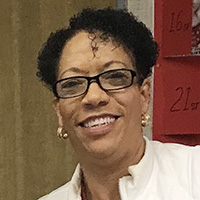
Charlene Smalls
Charlene Smalls is co-pastor of Ripple in Allentown, PA.
Mosaic values two-way communication and encourages our constituents to respond with feedback, questions, or encouragement. To share your thoughts or send a message to the author(s), contact us at communication@mosaicmennonites.org.
Creation is Calling for Peace
by Joyce Munro
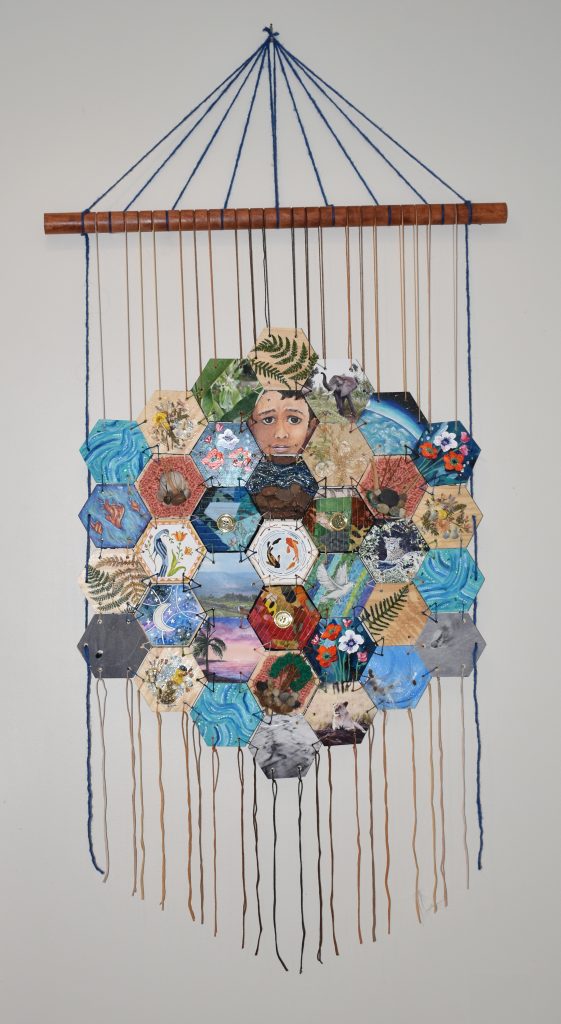
immersive and collaborative
An art installation of 12 Mosaic Conference artists suggests its theme: “Creation is Calling for Peace.” It is on display until September 28 at the Conference-Related Ministry Mennonite Heritage Center (Harleysville, PA), along with paintings and worship sanctuary art by Berdine Leinbach (Souderton [PA] congregation).
Ever since she visited Wonderspaces in Austin, TX, Leinbach has wanted to create an interactive multi-sensory art experience. How could she do that for her upcoming 2024 show at the Mennonite Heritage Center? In the Lapp gallery?
Ouisi, a game of associations, has a nature version that invites players to find patterns. “Everyone can notice, wonder, and connect,” Leinbach says about this game. The show idea grew to include the game, as well as an I-spy element.
Another question for Leinbach was: Could artists together create something around a creation theme?
The Interdependence Hexagon Project, an arts and educators collective based in Scranton, PA, uses this geometric shape to focus its makers on relationships that can be made visible and practiced in a world where shared values are needed if we are to survive.
Joy and Connection. These were Leinbach’s longings for the anticipated show. There it was—a hexagon project for Mosaic artists. With six equal sides to connect to other hexagons!
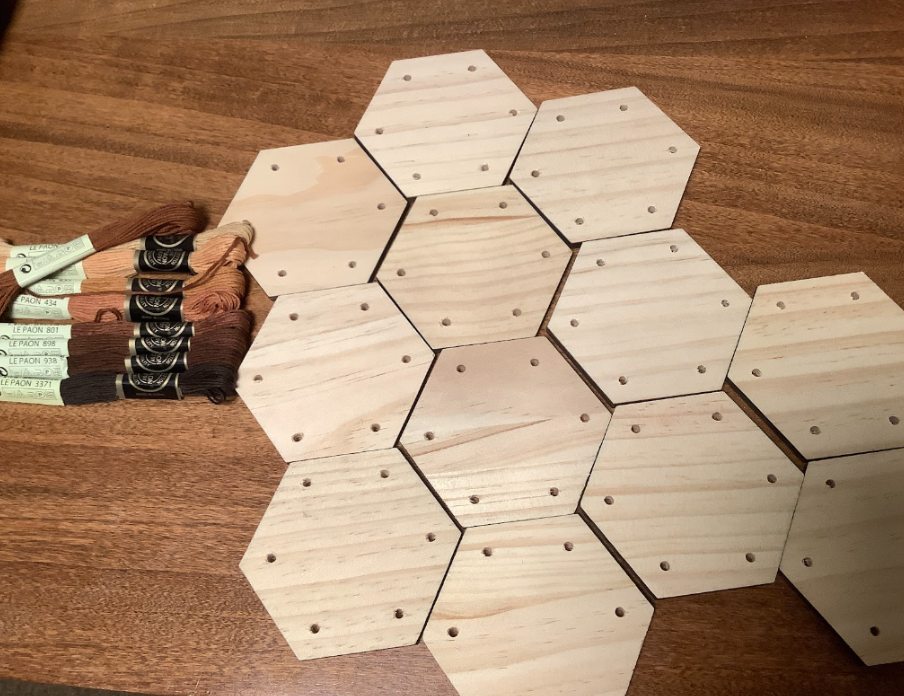
“Berdine asked if I’d be willing to collaborate in this project. I agreed without hesitation,” writes Ramona Pickett (7 Ways Home Fellowship), a liturgical dancer and life coach living in Maryland, with whom Berdine first brainstormed the project.
Leinbach and Pickett had worked together on the intercultural planning team for the October 2022 Mosaic Women’s Gathering. “I knew she was full of ideas and her creative outlet was dance and sewing,” Leinbach says. They brainstormed other artists they knew.
“Carla Garder was the first person who popped into my brain,” Ramona says. Carla and she worship together with 7 Ways Home Fellowship. So the project got a crochet enthusiast.
Glenn Bauman, Joanna Rosenberger, Kim Bergey, Libby Musselman, Lydia Sensenig, Mandy Martin, Tim Swartz, and Vicki Beyer were also on board.
So was Steve, Berdine’s husband and a graphic artist whose skills would be needed when it came to building a visual key for the installation with statements from the artists.
When the hexagons came back from the artists five months later, Berdine saw that no mammals were included (think Edward Hicks’ “The Peaceable Kingdom”). Steve searched through his photos. A lion, elephant, and a leopard made hexagonal entrances.
fusion, sometimes drama
Many individual hexagons speak for themselves:
Dramatic three-dimensional blues and white swirl on Vicki Beyer’s hexagons, sometimes in interlocking patterns. There’s tension and action here.
Poppies like shooting red and white stars pop—these are the flowers of Flanders and war; the artist Mandy Martin reminds viewers—not simply a signature subject of hers.
Subtle green tones and patterns occur in the quilted fabrics of Pickett’s earth hexagon; a gold button for the precious metal that Proverbs signifies is the result of purification provides continuity among her three hexagons.
A child looks at you, its brow furrowed, so that peering at the installation, you cannot help but feel that a trauma has occurred and you are here to wait for its voicing.
counterpoint
Several hexagons benefit from their placement among others:
A crescent moon among distant stars situates questions that night skies prompt, that religions seek to answer. . . abuts Fraktur symbols of Mennonite piety in Kim Bergey’s hexagons.
A grey so dark so close you must make of the scene something that’s almost terrifyingly your own meaning, even though your brain scrambles to categorize the image calmly. . . It is the breakdown of life carbon and mineral that up close is a sandy shore on a cloudy day. Tim Swartz attends to the turmoil narrative of creative process while finding calm in the patterns that happen where land and water meet.
I left the art installation feeling its silences:
the tiny pollinators that get mistakenly called “bees,”
unseen, the billions in a tablespoon of healthy soil and their absence in unhealthy soil,
the vulture gut and its glorious work,
edible oyster fungi growing on dead ash trees,
invisible methane escaping confined meat animals. . .
Then there is the vanilla bean that we are about to lose because of climate change.
What are life changes we could make if we would hear these creations calling for peace?
The collaborative work by Mosaic artists, along with many other of Leinbach’s paintings, are available for viewing at the Mennonite Heritage Center until Sept. 28, 2024.
A photo of this collaborative work was selected by the Hexagon Project’s Posters for Peace exhibit beginning at ArtWorks Gallery and Studio in Scranton from Sept 6-21. It is one of 40 selections out of 1,500 entries.
If your congregation or Conference-Related Ministry is interested in displaying the piece after the exhibit, please let Berdine Leinbach know.
Mosaic congregations and Conference-Related Ministries represented include Souderton Mennonite, Dock Mennonite Academy, Ambler [PA], Blooming Glen [PA] Mennonite, 7 Ways Home Fellowship, and Salford (Harleysville, PA) Mennonite.

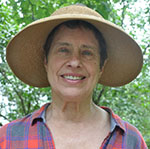
Joyce Munro
Joyce Munro is a member of Unami Friends Meeting and involved with the Carbon Forest Project. She is also a volunteer for the Mennonite Heritage Center (Harleysville, PA).
What is a Mennonite? Sharing our Roots with Conference-Related Ministries
by Margaret Zook
I was recently tickled to discover that the question, “what is a Mennonite?” can be answered in a two-minute Youtube video.
But to understand the practical theology which motivates and shapes today’s Conference-Related Ministries (CRMs) and their work of service requires much more.
CRM St. Luke’s Penn Foundation (SLPF) cabinet members and President Wayne Mugrauer gathered on a recent Monday morning to enter more deeply into the history of Anabaptist Mennonites.
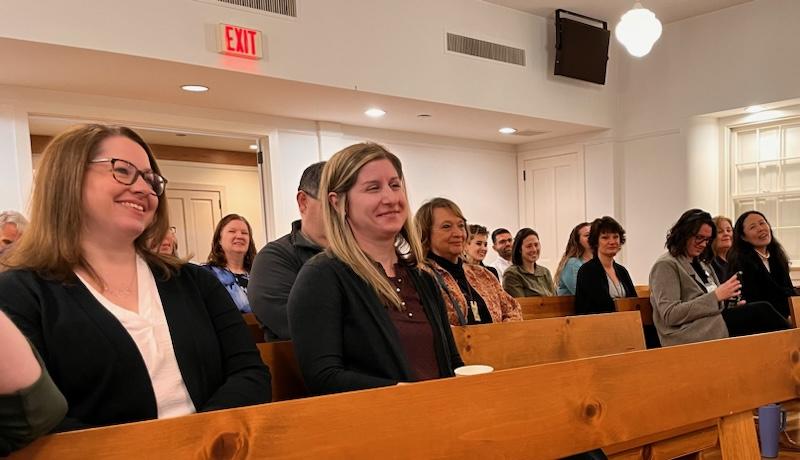
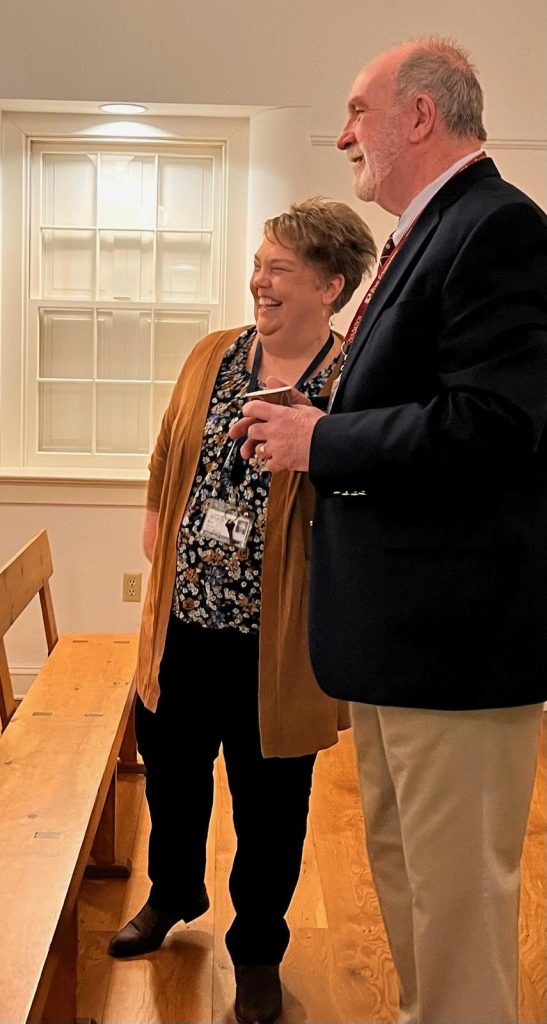
Since 1955, Penn Foundation has been connected to the Anabaptist community as a CRM, reflecting the faith of their founders and the biblical values that influence the organization. In July 2021, Penn Foundation joined St. Luke’s University Health Network, an institution with Catholic roots, creating a fully integrated health network based on shared values.
To understand the origins of the Anabaptist faith, there is no better place to enter the story than the exhibits and voices of the Mennonite Heritage Center (Harleysville, PA), another CRM. With stories, humor, and depth, Joel Horst Nofziger, Director of the Mennonite Historians of Eastern Pennsylvania (MHEP), led the group through an interactive tour.
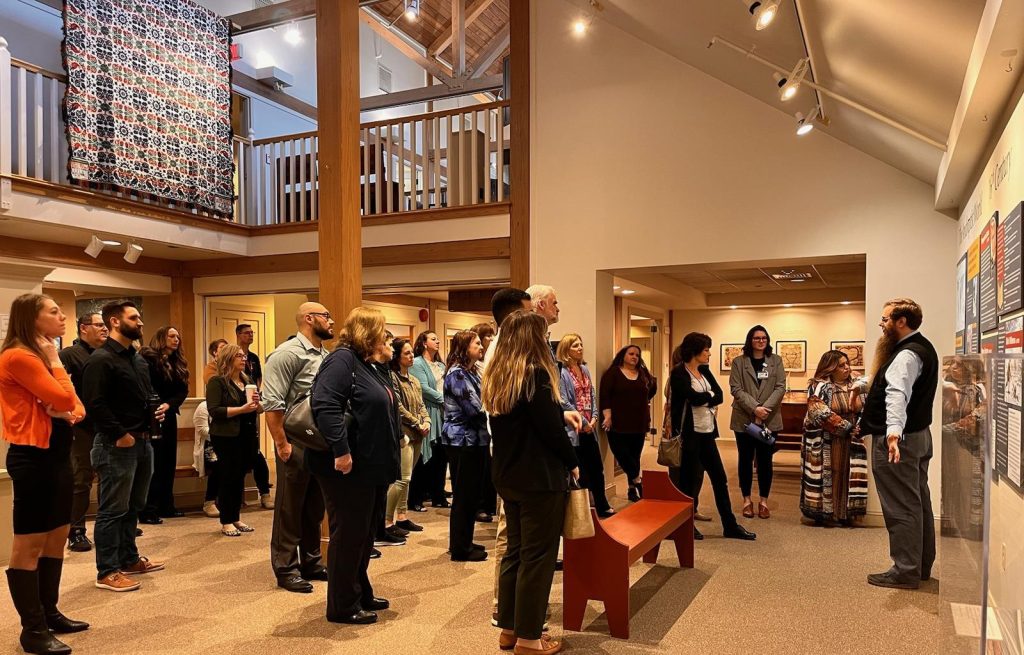
With curiosity and interest, the group lingered with questions of clarification exploring the connections and uniqueness of Catholic and Anabaptist values.
It was a rich morning of connections and relationships. I offer thanks to the organizations who invested time and resources to connect faith, beliefs, and works of service.
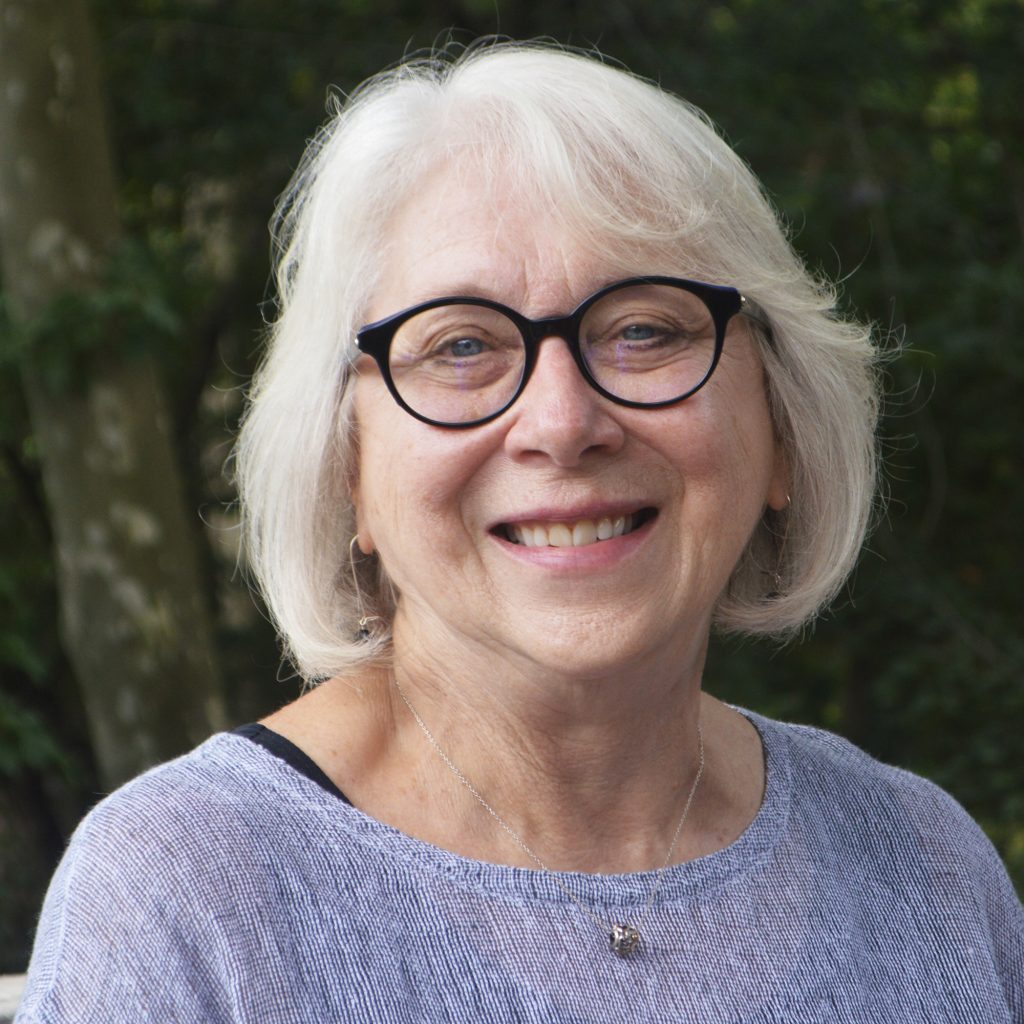
Margaret Zook
Margaret Zook is the Director of Collaborative Ministries for Mosaic Conference. She and husband, Wib, are members of Salford Mennonite Church and live in Harleysville, PA.
Disarmingly Effective
Book Review of: Disarmed: The Radical Life and Legacy of Michael “MJ” Sharp

The first words of the tribute to Michael “MJ” Sharp are disarming, “There is no way to peace along the way of safety. For peace must be dared, it is itself the great venture and can never be safe. – Dietrich Bonhoeffer.” The brutal death, likely assassination, of MJ Sharp at age 34 while working for the United Nations Group of Experts in the Democratic Republic of the Congo (DRC), urging rebels to lay down their weapons, is also disarming, in many ways.
In the book, Disarmed: The Radical Life and Legacy of Michael “MJ” Sharp, Marshall King gets to the heart of the disarming mission that cost Sharp and his colleague, Zaida Catalán, their lives on March 12, 2017. At the outset, King wrote, “I never felt that I would be the one to unravel this international murder mystery, and I did not attempt it in this book.” Instead, King wants to help the reader understand why Sharp felt called to be in, “the country that remains one of the world’s poorest and most dangerous places to live.”
The reader is taken on a journey through Sharp’s life: raised in a Mennonite home in Indiana with Mennonite pacifist values and ethics grounded in the Sermon on the Mount. Sharp attended Eastern Mennonite University (EMU) and was a good student and athlete. However, sprinkled in this traditional Mennonite upbringing was a flare for flashy cars and over-the-top pranks, an attraction for cards and gambling, and a restlessness with the safe and traditional. A professor and advisor at EMU said that Sharp, “thrived on risks.”
King guides us as Sharp comes of age with friends and girlfriends, travels and adventures, times of exuberance and depression, always following a thread of peacemaking – daring, disarming peacemaking. Sharp did peacemaking stints in Iraq, Afghanistan, and Israel/Palestine. Eventually, Sharp accepts the invitation of Mennonite Central Committee (MCC) representatives, Suzanne and Tim Lind, to teach nonviolent ways of peacemaking.
This invitation leads Sharp to the Democratic Republic of the Congo where he will serve, learn, and die. King provides a bit of Congolese history and his own pessimistic understanding of the DRC and situation in which Sharp operated, with layers of violence, corruption, and distrust among groups. In contrast, King presents Sharp’s optimistic approach to engaging combatants, government officials, rebel leaders, with his working belief, “You can always listen.”
Sharp’s approach included: arriving on a motorcycle, not in a motorcade; speaking French along with self-taught Swahili, not just English; respecting each person with whom he talks – listening to them; speaking up and speaking out when he saw injustice and unjust treatment. Sharp proved to be disarmingly effective. King follows Sharp’s successes in the DRC that will lead him deeper into conversations and investigations, eventually deeper into the bush for his final walk.
MJ’s family and friends also have their part the book. An account of John and Michele Sharp, MJ’s parents, seeking answers about MJ and Zaida from officials as high up as UN Ambassador Nikki Haley is poignant. Others recalled how they marveled at MJ’s combination of wit and intellect, humor, and humility.
At the end, King cannot help himself as he probes the “What happened?” question, including a chapter with information gathered and disinformation circulated about Sharp’s last mission. Who can meet this young man – so concerned with justice and just treatment of others – and not want to “seek justice” for his and Zaida’s deaths?
King invites full engagement with Sharp who ended up in one of the world’s challenging places to make peace. King also invites us to consider our place in the world of peacemaking and to find our place to be peacemakers today.
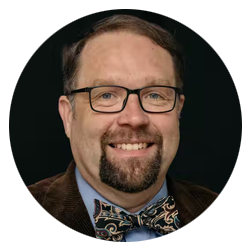
Marshall V. King, author, will be preaching at Salford Mennonite Church (Harleysville, PA) on Sunday, June 19, at 9:30am.
Join Marshall V. King, author, at a book signing and presentation on Sunday, June 19, from 2-3:30pm at Mennonite Heritage Center.
Conference Related Ministries (CRM) Profile: Mennonite Historians of Eastern Pennsylvania
by Mennonite Heritage Center staff
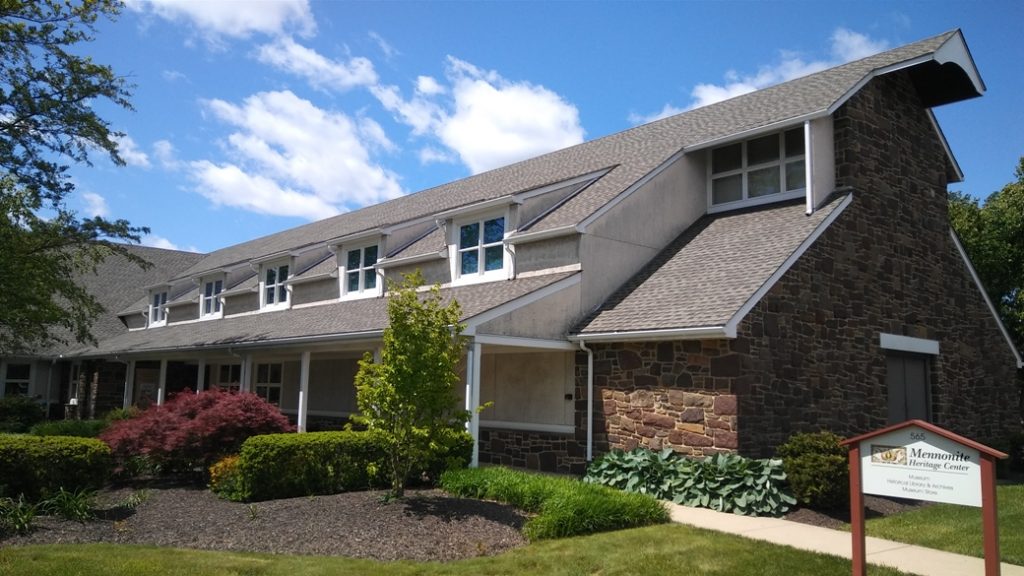
The Mennonite Heritage Center (MHC), is a nonprofit museum and historical library located at 565 Yoder Road, Harleysville, PA. It is home to the Mennonite Historians of Eastern Pennsylvania (MHEP) that were founded in 1974. Our mission is: To educate, inspire and witness to the church and community by collecting, preserving and sharing the Anabaptist/Mennonite story.
The MHC keeps the records of the Mennonite communities in Eastern PA who began immigrating from Europe in 1683. For centuries, these primarily Pennsylvania German congregations lived quiet lives, separated from other communities, maintaining their own schools until the mid-19th century, and speaking the Pennsylvania German dialect until the mid-20th century.
The MHC historical library has volumes relating to Mennonite and local history, faith, and life and an archive that includes rare books, manuscripts, and other printed materials. Manuscript collections vary from farming records to personal diaries and photographs. Many of the local congregations and Mosaic Mennonite Conference have chosen us to preserve their records. We invite people to use the library to do genealogical research.
One of the most significant museum collections is the fraktur collection. Fraktur is a kind of colorful illuminated manuscript. It is called fraktur because of the broken or fractured style of German lettering. The artifact collection also includes quilts, coverlets, samplers, clothing, furniture, farm implements, housewares and musical instruments.
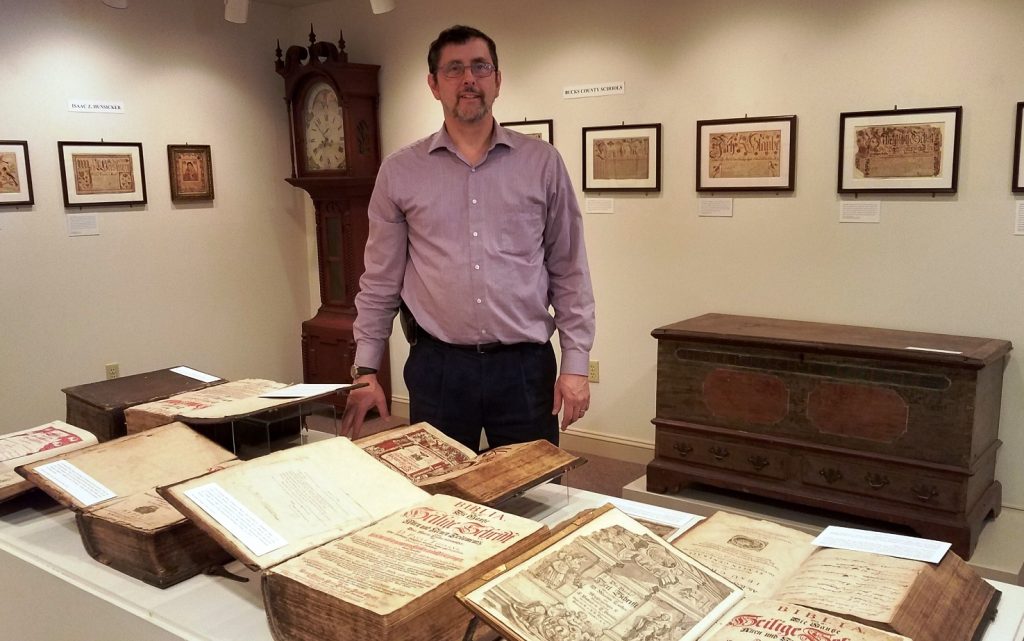
Because of the pandemic, we were closed from March 12 until July 1 and have been featuring posts on our website (mhep.org), our Facebook page, and the Pa Dutch at Home Companion blog, a joint project of the MHC and the Goschenhoppen Historians Schwenkfelder Library & Heritage Center.
In a more typical year, the MHC features exhibits and programs on Anabaptist and local history topics. Saturday workshop participants enjoy learning traditional crafts such as basket weaving, paper marbling, and fraktur drawing. The Whack & Roll Croquet Tournament that usually happens in spring, is now scheduled for Saturday, August 29 and is a fun competition with teams from area nonprofit organizations vying for cash prizes.
The annual Apple Butter Frolic, our fall harvest festival, will not be held this year but we are working on an event which will include pick-up sales of delicious traditional foods. The MHC will be sharing a portion of the proceeds from this revised October event with the Conference Shalom Fund to be used for food insecurity needs. Watch for information about this fall food celebration!
Our board and staff are thinking about our role as a place for Mennonites and the broader community to learn about the Mennonite heritage. We want to become more reflective of the growing diversity of the local Mennonite community today. We especially encourage people and congregations of color to visit the Mennonite Heritage Center, and contribute your family and faith stories to our collections, exhibits, and programming. Items can also be submitted for the archives digitally. We welcome volunteers to host in the museum and help with events and projects such as installing exhibits or archival sorting. You can also support the MHC with an annual membership. Memberships begin at $55/$45 annually and members receive our quarterly publication and discounts on workshops/purchases. Please contact us at 215-256-3020 or info@mhep.org for information on volunteering or becoming a member.
